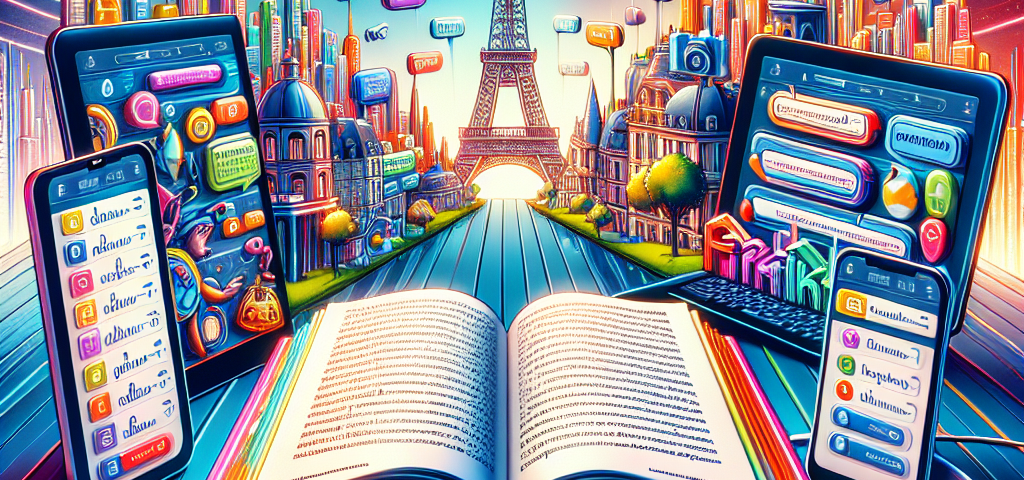
Speed Learning: How to Speak French Before Your Next Vacation!
May 28, 2025
Idioms to Impress: A Guide for GCSE French Students
May 28, 2025
In today’s globalized world, learning a new language has never been more accessible or exciting. Among the many languages gaining popularity, French stands out not just for its history and culture but also for its practicality in various fields such as business, travel, and international relations. For students aiming to master French vocabulary, numerous tools exist—apps, games, and other digital resources—that enhance the learning experience. This article explores these modern tools and how they can benefit today’s learners.
The Importance of Building a Strong Vocabulary
A robust vocabulary is the foundation of any language. It enables students to express themselves clearly, understand complex materials, and engage in meaningful conversations. To navigate the nuances of French, students must go beyond greetings and basic phrases. Therefore, employing interactive and engaging methods can make vocabulary acquisition more efficient and enjoyable.
Apps: Learning at Your Fingertips
1. Duolingo
Duolingo is one of the most popular language-learning applications worldwide. Its gamified approach makes learning French fun and addictive. With bite-sized lessons focusing on vocabulary, grammar, and pronunciation, students can steadily build their language skills. The app uses spaced repetition algorithms to ensure that words are reinforced at optimal intervals, making retention much easier.
2. Babbel
Babbel takes a slightly different approach by emphasizing conversation. Its lessons are designed using real-life dialogue and practical vocabulary, making it a great choice for students who want to understand how French is used in daily interactions. The app also offers cultural insights, enriching the learning experience with context.
3. Memrise
Memrise combines vocabulary learning with memory techniques to help students retain new words effectively. Featuring video clips of native speakers, it allows learners to hear authentic pronunciation and inflection. Its gamified system rewards progress, turning vocabulary mastery into a fun challenge.
4. Anki
For students who are serious about memorization, Anki provides a powerful flashcard system based on spaced repetition. Users can create their own cards or download pre-made decks, allowing for customized vocabulary practice tailored to individual needs. Anki facilitates long-term retention of vocabulary, making it an invaluable tool for serious learners.
Games: Learning Through Play
1. Wordament
This multiplayer word game allows players to connect adjacent letters in a grid to form words. Although not exclusively for French, players can choose the French version, engaging in competitive play while enhancing their vocabulary. Wordament encourages quick thinking and reflexes, making it an exhilarating way to practice.
2. Scrabble
The classic word game Scrabble also has a French version available. Playing Scrabble in a foreign language allows students to think critically about spelling and word formation while enjoying a friendly competition. It’s a great way to engage with family and friends and practice vocabulary in a relaxed setting.
3. Quizlet Games
Quizlet offers a variety of study tools, but its games—like "Match" and "Gravity"—are particularly effective for vocabulary acquisition. Students can create their own sets of French vocabulary words or use sets created by others to play these interactive games, reinforcing their learning through repetition and competition.
Online Communities and Resources
1. YouTube Channels
Harnessing the power of visual learning, YouTube channels like "Francais Authentique" and "Learn French with Alexa" offer engaging content that focuses on vocabulary acquisition among other language skills. By watching and listening, students can immerse themselves in the language, picking up context and usage effortlessly.
2. Language Exchange Platforms
Platforms like Tandem and HelloTalk allow students to connect with native French speakers. These exchanges provide invaluable opportunities for vocabulary practice in real-life conversations, helping students refine their speaking and listening skills.
3. Podcasts
Listening to French podcasts is another excellent way to absorb vocabulary in context. Shows like “Coffee Break French” and “Pimsleur French” cater to various levels, allowing students to choose an appropriate challenge while enjoying engaging stories and discussions.
Conclusion
For modern students, learning French vocabulary has evolved into an interactive and enjoyable process, thanks to various apps, games, and online resources. By incorporating these tools into their study routines, learners can effectively enhance their vocabulary, foster a greater understanding of the language, and ultimately become more confident in their French-speaking abilities. Whether you’re a beginner or looking to polish your skills, embracing technology can transform your learning journey and open new doors to the francophone world. Au revoir, and happy learning!

